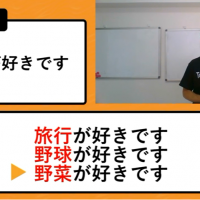Teenagers are experts in creating new words. If you listen closely at Japanese teenagers chatting, you will realize how often they use slangs. Slangs are big communication tools for them to have an exciting conversation. There may not have been any opportunities to use Japanese slangs, but how about adding new words in your Japanese vocabulary book? Here are 5 trending Japanese slangs. Let’s take a look!
5 Japanese Teen Slangs

1. えぐい (e-gu–i)
The actual meaning of えぐい is “harsh taste”, and it turned to be used as an expression of tough or cruel. However, current young people use it not only as a negative meaning, but also to describe a positive feeling. In the latter case, they use えぐい instead of すごく (su-go-ku) which means very.
Examples
In a positive way「君のお兄ちゃん、えぐいかっこいいね!」 (Your big brother’s very hot!)
In a negative way「君の上司はえぐい人だね。」 (Your boss has offensive personality.)
2. タピる (ta-pi-ru)
タピる means, “going to buy a bubble tea”. タピ (ta-pi) comes from tapioca and る (ru) comes from ~する, which means do something. Currently, tapioca is super popular in Japan, especially teenagers are addicted to it. This word emerged because of the boom and it’s often used on Instagram and Twitter as a hash tag. If you’re interested in this topic, please check this blog about the booming of tapioca in Japan.
Example
「今日の放課後タピらない?」 (How about going to get bubble teas this afterschool?)
3. やばみざわ (ya-ba-mi-za-wa)
Do you know a slang “やばい (ya-ba-i)”, which is really useful but also complicated? Japanese people often use this word, and やばみざわ is derived from やばい. やばい can be used in any situation. For instance, when you ate something really delicious, you can say やばい as a meaning of super tasty. Other than that, when you are in trouble, you can also use やばい to describe your situation. やばみざわ is almost the same meaning, but this word sounds a little bit casual. It is said that a popular Japanese YouTuber, Kemio started using this word. みざわ (mi-za-wa) has no meaning, but somehow the teenagers like its sound.
Example
「明日テストあるんだけど!やばみざわ…」 (I have exams tomorrow! Oh my gosh…)
4. ちな (chi-na)
This slang is a shortening of a Japanese word “ちなみに (chi-na-mi-ni)” which means “by the way” in English. Japanese people tend to shorten words like スタバ (su-ta-ba), a shortened version of Starbucks, or あけおめ (a-ke-o-me) for あけましておめでとう (a-ke-ma-shi-te-o-me-de-to-u), which means “happy new year”. ちな is normally used as a written language.
Example
「映画おもしろかったね!ちな、これから何食べる?」
(The movie was exciting! By the way, what are we gonna eat from now?)
5. エモい (e-mo-i)
エモい describes one’s emotions are running high. This slang also has several meanings like やばい, but many young people use it especially when they become emotional or be impressed. エモ is derived from an English word, emotional.
Example
「このドラマすごいエモかったよ!おススメ!」 (This drama was really emotional! I recommend it!)
***
If you know what the slang means, it’ll be easier to understand the content of conversation. It’s really important to learn correct Japanese, of course. However, if you’re interested in, why don’t you study casual slangs and increase your vocabulary?
?Read more TalentHub blogs: https://talenthub.jp/blog/?lang=en









